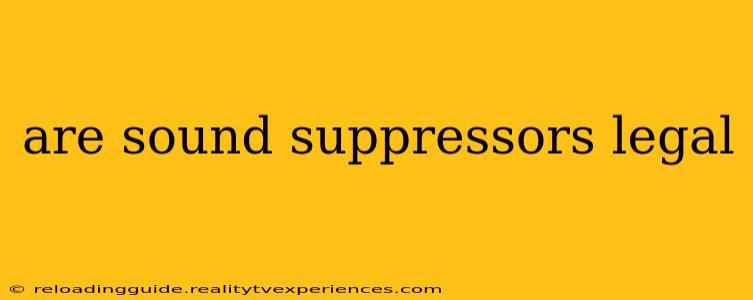The legality of sound suppressors, often mistakenly called silencers, is a complex issue with significant variations depending on location. While the term "silencer" is commonly used, the more accurate term is "sound suppressor" as they significantly reduce, but don't eliminate, the sound of a firearm. This guide will clarify the legal landscape surrounding sound suppressors in the United States and offer insights into international regulations.
US Federal Laws Regarding Sound Suppressors
At the federal level in the United States, sound suppressors are regulated under the National Firearms Act (NFA) of 1934. This act classifies sound suppressors as NFA items, requiring registration with the Bureau of Alcohol, Tobacco, Firearms and Explosives (ATF) and adherence to specific regulations. This means:
- Registration is mandatory: Before owning a sound suppressor, you must register it with the ATF. This involves a thorough background check and paying a tax.
- Transfer restrictions: Transferring ownership of a registered sound suppressor also requires ATF approval and involves further background checks.
- Strict record-keeping: Owners are responsible for maintaining accurate records of their registered sound suppressors.
State Laws: A Patchwork of Regulations
While federal law dictates the basic framework, individual states have the authority to impose additional restrictions or even outright bans on sound suppressors. This creates a complex regulatory environment where legality can change dramatically depending on your location. Before purchasing or possessing a sound suppressor, you must research the specific laws in your state. Some states may:
- Require additional permits: Beyond the federal registration, some states require additional permits or licenses for sound suppressor ownership.
- Prohibit certain types: Some states might ban specific types of sound suppressors or restrict their use with certain firearms.
- Implement stricter background checks: States may have more rigorous background check processes than those mandated at the federal level.
- Outright bans: A few states have completely banned the possession of sound suppressors.
International Laws: A Diverse Landscape
The regulations surrounding sound suppressors vary greatly internationally. Many countries have strict controls similar to the US NFA, requiring permits and registration. Others may have less stringent regulations, while some may have outright bans. If traveling internationally with a sound suppressor, understanding the laws of each country you'll be visiting is crucial. Failing to comply with local laws can result in serious legal consequences.
Understanding the Misconceptions
The portrayal of sound suppressors in media often creates misconceptions about their capabilities. It's vital to understand that sound suppressors:
- Do not silence firearms completely: While they significantly reduce the sound, they don't make firearms completely silent. The sound reduction varies depending on the suppressor's design and the firearm used.
- Are not inherently dangerous: Sound suppressors themselves are not inherently dangerous. Their legality and use are governed by the regulations surrounding their association with firearms.
The Importance of Responsible Ownership
Regardless of where you live, responsible ownership of sound suppressors is paramount. This includes:
- Thorough research: Understanding all applicable federal and state laws before purchasing.
- Compliance with regulations: Adhering to all registration, transfer, and record-keeping requirements.
- Safe storage: Storing sound suppressors securely to prevent unauthorized access.
This guide provides a general overview of sound suppressor legality. It is essential to consult with legal professionals and relevant authorities to ensure compliance with all applicable laws in your specific jurisdiction. The information provided here is for educational purposes only and does not constitute legal advice.

